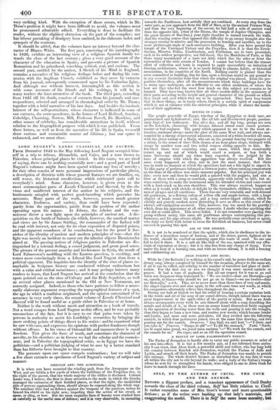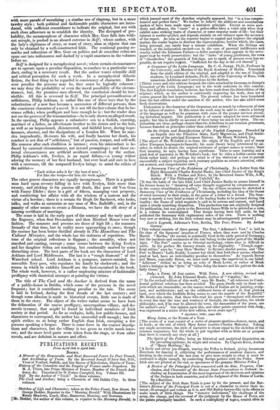SELF, BY THE AUTHOR OF CECIL. THE COCK AND THE
ANCHOR.
BEYOND a flippant preface, and a transient appearance of Cecil Denby towards the close of the third volume, sef has little relation to Cecil. It rather resembles some of Mrs. Gore's worser and more questionable fictions ; as if the writer were hashing up that lady's materials, and exaggerating the moclel. There is in Sey the same loose morality, but with more parade of moralizing ; a similar use of claptrap, but in a.more tawdry style ; both political and fashionable public characters are intro- duced, with sufficient resemblance to indicate the original, but not with such close adherence as to establish the identity. The disregard of pro- bability, the metamorphose of character which Mrs. Gore falls into with- out scruple, is pushed to an absurd extreme in Self; whose author, with the lady's slightness of story, or want of story, aims at objects that can only be obtained by a well-constructed fable. The continual passing re- marks and reflections of Mrs. Gore on politics and de omnibus rebus are spun out into tediousness and dashed by a vapid smartness in the volumes before us.
Self is designed for a metaphysical novel; where certain circumstances are to operate upon a peculiar disposition, to conduce to a particular con- duct, ending in a necessary result. But the author wants scientific skill and critical perception for such a work. In a metaphysical didactic fiction, the first thing to be regarded is consistency of character. How- ever peculiar the persons may be, they must be logically coherent : we may deny the probability or even the moral possibility of the circum- stances, but, the premises once allowed, the conclusion should be irre- sistible. All this is reversed in Self. The principal personification of selfishness, Philip Askham, is rather like one of those toys that by the substitution of a new face become a succession of different persons, than the consistent character of a novel. It is not till the last volume that he be- comes selfish ; when profligate and base enough he is : but the reader does not see the process of the transmutation—he is only shown an alleged result. In the opening, Philip appears a submissive son to a foolish, exacting, martinet of a father, an affectionate brother to his sisters and to the heir, as well as an impassioned, disinterested, and faithful lover, during hope- lessness, absence, and the dissipations of a London life. When he mar- ries imprudently, ill-treats his wife, and finally hastens her death, his conduct is not that of "selfishness," but of passion, temper, and self-will. His remorse after each ebullition is intense; even his misconduct is in- duced by external circumstances, not inward promptings ; and those ex- ternal circumstances are artificial accidents contrived by the author. Philip Askham's wife, Evelyn, is an equal failure,—a young widow adoring the memory of her first husband, but over head and ears in love with a successor, till the nonpareil Evelyn brings to mind the relicts of the satirist-
" Each widow asks it for the best of men'; For him she weeps—for him she weds again."
The other graver characters are equally incongruous. There is a gentle- man hard upon seventy falling in love with Evelyn, little more than twenty, and sticking to his passion till death, like poor old Von Genz with Fanny ElLsler ; there is a girl of fifteen, managing vast property, and conducting her affairs with all the wisdom of a matron and the virtue of a heroine; there is a certain Sir Hugh De Bayhurst, who looks, talks, and walks as saturnine as any man of Mrs. Radcliffe ; and, in the panoity of other means to create a dilemma, we have the old story of a missing certificate of marriage.
The scene is laid in the early part of the century and the early part of the Regency, when first Devonshire and then Hertford House were the fashion. The manners and persons are those of high life ; the manners formally of that time, but in reality more approaching to ours; though the essence has been better distilled already in The Hamiltons and The Cabinet Minister, and the whole has the staleness of repetition. The tone of the original reflections is flippant ; the morality, when not starched and canting, corrupt ; some scenes between the dying Evelyn and her daughter Selina are touching, but continually marred by some disturbing error. The best parts of the book are the characters of Lord Askham and Lord Middlemore. The last is a "rough diamond" of the Waterford school. Lord Askham is a pompons, narrow-minded, in- accessible Tory peer, who regulates his family by clockwork ; and the scenes in which he exhibits himself are the best-sustained in the book. The whole work, however, is a rather unpleasing mixture of fashionable profligacy with theatrical attempts at painting the virtues.
The title of The Cock and the Anchor is derived from the name of a public-house in Dublin, which some of the persons in the novel frequent; but it contributes nothing peculiar to the tale. The scene is laid in Ireland, during the first decade of the last century; and though some allusion is made to historical events, little use is made of them in the story. The object of the writer rather seems to have been the delineation of the coarse profligacy, unscrupulous villany, and do- mestic tyranny, that might be found in individual members of Irish society at that period. As far as cockpits, hells, low public-houses, and characters to correspond, the author has succeeded well enough ; but the spirit strikes us as being rather English than Irish, excepting a few persons speaking a brogue. There is some force in the coarser descrip- tions and characters, but the villany is too gross to excite much inter- est; and the more level parts seem taken from the stage, or from other novels, and are deficient in nature and effect.



























 Previous page
Previous page